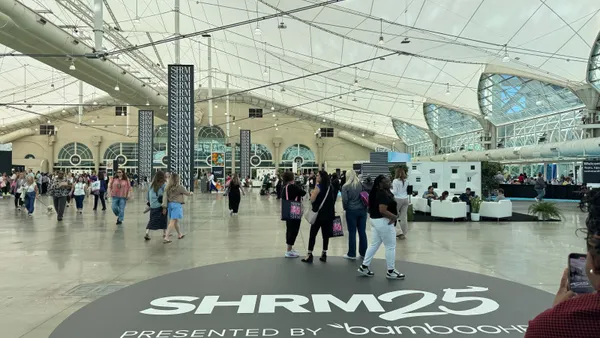Dive Brief:
- Ninety-one percent of HR executives reported this year was their hardest at work to date, according to a Verizon Media study released in June. Just under half had reached out for help regarding their mental health.
- The vast majority of survey respondents (87%) said that mental health is the foremost "impact of the past year on the workforce." That impact directly affects business' bottom lines, according to 93% of the survey's 1,000 participants. Despite this, most managers said they lack confidence when discussing mental health and other topics such as race and gender.
- Transparency about mental health may bolster workplace support, the survey found. Slightly fewer than a third of respondents said they have a mental health condition. Those respondents were more likely to recognize "the mental toll of the past year," and they were more frequently tapped by workers who needed help with something related to their well-being.
Dive Insight:
The impact of the coronavirus on worker mental health wasn't unanticipated. In September 2020, Unum foresaw a "mental health tsunami," emphasizing the particular toll the pandemic took on working parents.
Verizon Media's research revealed that many workplace leaders were concerned about mental health — a finding that echoes results of other surveys. In a January Paycor report, 86% of surveyed business leaders said they were worried about the mental health of their workers. And just as Verizon Media's participants confessed their timidity in talking about mental well-being, nearly half of Paycor's respondents said they were unsure what benefits or services they could offer as help.
Some organizations are finding ways to support workers. Verizon Media, along with Kellogg Company, Snap and Spotify, announced an initiative aiming to "set a new standard in how employees are supported at work" in April. Hootsuite instituted a companywide week off, which it dubbed "Wellness Week," in July.
Companies' efforts may not always impress, however. Amazon sparked outrage and ridicule when it introduced its "AmaZen" stations, small kiosks intended to provide workers space to focus on their mental health. Some compared the stations to phone booths; others, to portable toilets.
Amazon's misstep offers organizations a lesson, sources previously told HR Dive. Leaders must evaluate proposals to enhance mental health offerings carefully, especially if they lack the credentials and training that qualify psychologists, psychiatrists and other mental healthcare professionals.














